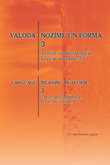Par kļūdām jeb variācijām 2. personas daudzskaitļa paradigmā
About mistakes (or variations?) in the 2nd person plural paradigm
Author(s): Aina UrdzeSubject(s): Language and Literature Studies, Theoretical Linguistics, Language acquisition, Baltic Languages, Migration Studies
Published by: Latvijas Universitātes Akadēmiskais apgāds
Keywords: nestandarta valoda; morfēmu variācija; gramatisko likumu maiņa;
Summary/Abstract: This study is dedicated to the research of the Latvian language spoken in exile communities. Assuming that the Latvian language used by Latvians abroad is deviating to some extent from the common language standard in Latvia, I consider the mixing-up or non-standard use of the endings for 2nd person plural indicative or imperative, respectively, an instance of this tendency towards non-standardness. If one takes into account the bilingual circumstances of exile community speakers, a lack of standard language examples and a certain simplification of the exile language variety can be expected. I suspect that exile speakers abandon the formal distinction of the imperative and indicative mood, resulting in both 2nd person plural endings ( at(ies)/ āt(ies) and iet(ies)) being available as markers for both functions. In order to identify the frequency of both endings, several Latvian language corpora have been used: samples of exile Latvian collected in fieldwork recordings and interviews and Latvian text corpora representing spontaneous and literary language production in Latvia. Unfortunately, the exile variety corpora are still quite narrow, failing to provide a sufficiently reliable database. Nevertheless, a somewhat larger distribution of non-standard forms can be proven both in the exile samples and in spontaneous language in Latvia. The deviation occurs in both directions – mistaking the ending at(ies)/ āt(ies) for imperative and the ending iet(ies) for indicative. The presence of the reflexive marker can be identified as one factor influencing the choice of endings.
Journal: Valoda: nozīme un forma
- Issue Year: 2013
- Issue No: 3
- Page Range: 118-131
- Page Count: 14
- Language: Latvian

